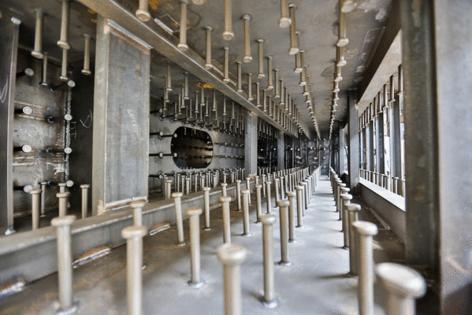US signs $80 billion pact to boost nuclear power in AI push
Published in Science & Technology News
The U.S. agreed to support the construction of large-scale reactors from Westinghouse Electric Co. worth at least $80 billion, pledging much-needed government backing for the industry in the latest push to meet surging demand for electricity from artificial intelligence.
Financial assistance from the Trump administration is seen as key to giving companies the confidence they require to pursue the construction of expensive and time-consuming nuclear reactors. At the same time, it helps the White House deliver on its goal of scaling up an industry that’s seen as vital to competing with China.
Westinghouse, as well as its owners Brookfield Asset Management and Canadian uranium producer Cameco Corp., said on Tuesday that the initiative will create tens of thousands of jobs across the US. Cameco shares rose as much as 20% to a record high after the announcement, and Brookfield gained as much as 3.3% in New York.
Power consumption from U.S. data centers will likely double by 2035, reaching almost 9% of total demand, according to BloombergNEF. That’s driving the interest in building new reactors. However, the projects typically take years to complete and recent efforts in the US have gone well over budget. That’s made companies wary of taking on financial risk.
“This administration wants to take a muscular approach to support new, advanced reactors,” said Tim Fox, an analyst at ClearView Energy Partners. “Having this policy support for nuclear energy may be necessary.”
While many of the hopes for a nuclear renaissance in the U.S. are focused on developing small modular reactors, the Westinghouse pact is for large, conventional reactors. It follows a deal by power developer Fermi Inc. to begin production of four big reactors that would be used for a private data-center campus in the Texas Panhandle.
The Westinghouse agreement comes against the backdrop of a sluggish U.S. nuclear buildout: only three conventional reactors have been completed in America this century and none are currently under construction. Several large technology companies have agreed to buy power from shuttered reactors, a strategy aimed at producing fission power faster.
Google’s parent Alphabet Inc. agreed on Monday to a long-term power-purchase deal with NextEra Energy Inc., which expects to restart a closed Iowa reactor in 2029. In addition, Constellation Energy Corp. is working to bring one of the reactors at Three Mile Island in Pennsylvania back into service by 2027 and Holtec International plans to restart the Palisades plant in Michigan by early next year.
Meanwhile, Brookfield is in talks with South Carolina utility Santee Cooper about finishing the partially built VC Summer project that was abandoned in 2017 as costs spiraled.
In the Westinghouse deal, few details were disclosed. The U.S. said it will “arrange financing and facilitate the permitting and approvals” for the new reactors, without being more specific.
The money will likely come from a variety of sources, including grants, loans and other tools, ClearView’s Fox said. He suggested the details are still being worked out, and called the statement “purposefully vague.”
The permitting part is critical because getting approval from federal regulators for new nuclear plants can take years. The White House is pushing the Nuclear Regulatory Commission to streamline its process, but it’s unclear what kind of changes the agency may make.
Each two-unit Westinghouse AP1000 site creates or sustains 45,000 manufacturing and engineering jobs in 43 states, and a national deployment will create more than 100,000 construction jobs, the companies said. There are six AP1000 reactors in operation and the technology has been selected for programs in Poland, Ukraine and Bulgaria.
“The program will cement the United States as one of the world’s nuclear energy powerhouses and increase exports of Westinghouse’s nuclear-power generation technology globally,” according to the statement.
The Trump administration has been aggressive about backing large U.S. companies, pursuits that are making the government a major player in several big industries. It’s taken an almost 10% equity position in Intel Corp. and acquired a stake in United States Steel Corp.
The U.S. also is in talks to access one of the world’s largest untapped deposits of tungsten, a metal used by the Pentagon to make ammunition, projectiles and other weaponry. Separately, it’s agreed to a $400 million equity investment in MP Materials Corp. to secure a supply of magnets critical for military and other applications.
(Updates with comment from analyst in fifth paragraph. An earlier version of the story corrected the number of completed reactors in seventh paragraph.)
©2025 Bloomberg L.P. Visit bloomberg.com. Distributed by Tribune Content Agency, LLC.







Comments